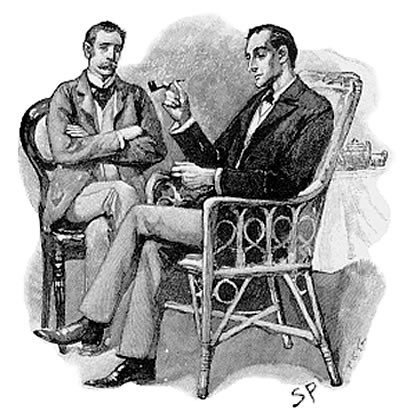Today marks the 153rd birthday of Sir Arthur Conan Doyle, the man behind Sherlock Holmes. To celebrate (and console ourselves over the end of the second season of the Masterpiece Mystery series), we’ve rounded up some words about mysteries and mystery solvers.
The word detective, which came about in the early 1800s, was originally short for detective police. Detective is the adjectival form of detect, which comes from a Latin word meaning “to uncover.” Tec is an abbreviation of detective that originated in 1879.
The origin of sleuth is less direct. The word, which has Old Norse origins, came about in the 13th century, says the Online Etymology Dictionary, and meant “track or trail of a person.” This sense of sleuth gave us sleuthhound, a kind of bloodhound, which gained the figurative meaning of “keen investigator” in 1849. In 1872, this sense of sleuthhound was shortened to sleuth.
Hawkshaw is American English slang and comes from the “name of the detective in ‘The Ticket-of-Leave Man,'” a 19th century British play. (A ticket of leave, in case you were wondering, is “a license or permit given to a convict, or prisoner of the crown, to go at large, and to labor for himself before the expiration of his sentence.”) Snoop, another synonym for detective, gained its mystery-solving meaning around 1891. It originally meant “to go about in a prying or sneaking way” and probably comes from the Dutch snoepen, “to eat on the sly.”
While the character Sherlock Holmes first appeared in print in 1887, it wasn’t until 1903 that sherlock came to mean “detective” in general. The phrase no shit, Sherlock, said when someone is being obvious, seems to have gained popularity in the 1980s. However, we did find a mention in a 1976 book, No Bugles, No Drums.
Gumshoe originated around 1906, and comes from “the rubber-soled shoes [detectives] wore,” perhaps because they allow the wearer “to move about stealthily.” Dick meaning detective “is recorded from 1908, perhaps as a shortened variant of detective.” Shamus, slang for a police officer or private investigator, may come from the Hebrew shamash, “servant,” referring to the “sexton of a synagogue,” and influenced by the Irish name Seamus, or James, “a typical name for an Irish cop.”
A skip tracer specializes in “finding people who have attempted to disappear,” with the idea of tracing someone who has skipped town. We couldn’t find an origin, though we did spot this mention in a newspaper article from 1930 about lexicographers and slang expressions: “Of course, I know without being told what a stick-up artist is, even tho yesterday I did not know what a skip-tracer was.”
Finally, private eye was first recorded around 1938, according to World Wide Words, and is “a pun derived from private investigator, via the abbreviations PI and private I.”
Usually where there’s a detective, there’s a mystery. Mystery in the sense of ‘detective story’ was first recorded in 1908. The word originally referred to ancient religious rites such as “purifications, sacrificial offerings, processions, songs, dances, dramatic performances, and the like” before it came to mean anything “of which the meaning, explanation, or cause is not known, and which awakens curiosity or inspires awe.”
A whodunit is “a story dealing with a crime and its solution,” while a howdunit focuses not on who committed the crime but how the crime was committed. Similar is a howdhecatchem, also known as an inverted detective story, which reveals the crime and perpetrator in the beginning, then focuses on how the perpetrator was caught by the crime-solver. In a locked room mystery, the crime is “committed under apparently impossible circumstances,” involving a “crime scene that no intruder could have entered or left, e.g., a locked room.” A procedural is so-called because it involves a sequence of technical details or procedures.
Hard-boiled meaning “callous” came about around 1886. The origin of the hard-boiled detective is unclear although we did find this citation in a 1925 issue of Collier’s Magazine. Hard-boiled fiction, which gained popularity in the 1920s and 1930s, is “ distinguished by the unsentimental portrayal of violence and sometimes sex.” Noir is a type of crime literature that features “tough, cynical characters and bleak settings,” and is short for the French roman noir, literally “black novel,” a type of gothic fiction.
In cozy mysteries, or cozies, “sex and violence are downplayed or treated humorously, and the crime and detection take place in a small, socially intimate community.” The crime-solvers are “nearly always amateurs. . .and frequently women” who are “well-educated, intuitive, and often hold jobs (caterer, innkeeper, librarian, teacher, dog trainer, shop owner, reporter) that bring them into constant contact with other residents of their town and the surrounding region.” The blog Traditional Mysteries does a great job researching the origin of the term, tracing it back to the early 1960s. The term may come from tea cozy.
For even more mystery words, check out this list of snoops, some perponyms, and these words noir.
[Photo: CC BY 2.0 by timofeia]
